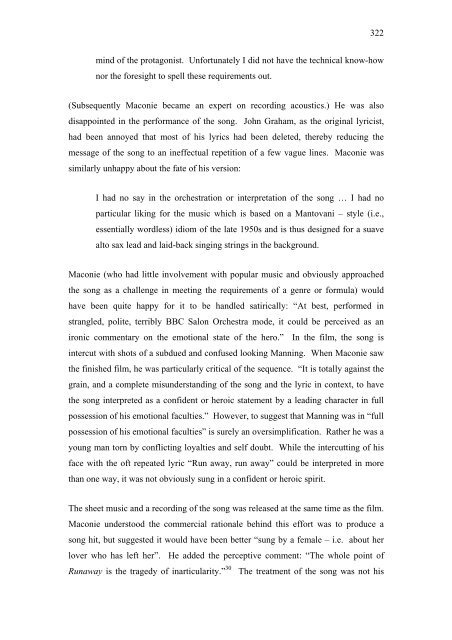Copyright Statement - ResearchSpace@Auckland
Copyright Statement - ResearchSpace@Auckland
Copyright Statement - ResearchSpace@Auckland
Create successful ePaper yourself
Turn your PDF publications into a flip-book with our unique Google optimized e-Paper software.
322<br />
mind of the protagonist. Unfortunately I did not have the technical know-how<br />
nor the foresight to spell these requirements out.<br />
(Subsequently Maconie became an expert on recording acoustics.) He was also<br />
disappointed in the performance of the song. John Graham, as the original lyricist,<br />
had been annoyed that most of his lyrics had been deleted, thereby reducing the<br />
message of the song to an ineffectual repetition of a few vague lines. Maconie was<br />
similarly unhappy about the fate of his version:<br />
I had no say in the orchestration or interpretation of the song … I had no<br />
particular liking for the music which is based on a Mantovani – style (i.e.,<br />
essentially wordless) idiom of the late 1950s and is thus designed for a suave<br />
alto sax lead and laid-back singing strings in the background.<br />
Maconie (who had little involvement with popular music and obviously approached<br />
the song as a challenge in meeting the requirements of a genre or formula) would<br />
have been quite happy for it to be handled satirically: “At best, performed in<br />
strangled, polite, terribly BBC Salon Orchestra mode, it could be perceived as an<br />
ironic commentary on the emotional state of the hero.” In the film, the song is<br />
intercut with shots of a subdued and confused looking Manning. When Maconie saw<br />
the finished film, he was particularly critical of the sequence. “It is totally against the<br />
grain, and a complete misunderstanding of the song and the lyric in context, to have<br />
the song interpreted as a confident or heroic statement by a leading character in full<br />
possession of his emotional faculties.” However, to suggest that Manning was in “full<br />
possession of his emotional faculties” is surely an oversimplification. Rather he was a<br />
young man torn by conflicting loyalties and self doubt. While the intercutting of his<br />
face with the oft repeated lyric “Run away, run away” could be interpreted in more<br />
than one way, it was not obviously sung in a confident or heroic spirit.<br />
The sheet music and a recording of the song was released at the same time as the film.<br />
Maconie understood the commercial rationale behind this effort was to produce a<br />
song hit, but suggested it would have been better “sung by a female – i.e. about her<br />
lover who has left her”. He added the perceptive comment: “The whole point of<br />
Runaway is the tragedy of inarticularity.” 30 The treatment of the song was not his















